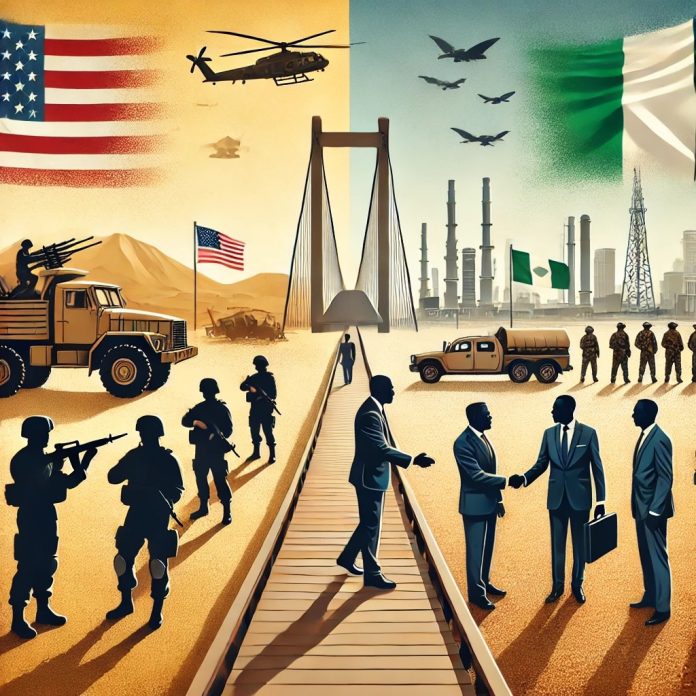..Shaped Policies—and What Nigeria Can Learn
Why has the U.S. been so involved in the Persian Gulf? To answer that, we need to look at some key moments in history and what they mean for today’s policies under President Biden. From wars to diplomatic moves, the U.S. has played a major role in the Middle East. But what can we learn from it all, and how does it connect to what President Biden is doing now? And importantly, what lessons can Nigeria take from these experiences?
Why the Gulf Matters
The Persian Gulf is important for one big reason: oil. In the 1980s, President Jimmy Carter made it clear that the U.S. would defend the region to keep oil flowing smoothly. This set the stage for America’s military presence and interventions in the Gulf. The goal? To make sure the U.S. and its allies had enough energy for their needs.
A big moment came during the Iran-Iraq War (1980-1988). The U.S. supported Iraq even though Saddam Hussein was known for his harsh tactics. Why? Because the U.S. didn’t want Iran, after its 1979 revolution, to grow too powerful. This move wasn’t just about choosing sides—it was about protecting U.S. interests in the region.
The Gulf War: A Big Turning Point
In 1991, Saddam Hussein led Iraq to invade its neighbor Kuwait. This act sent alarm bells ringing in Washington, D.C. President George H.W. Bush led a coalition of countries to push Iraq out in a mission called Operation Desert Storm. While this was officially about protecting Kuwait, it also showed how serious the U.S. was about protecting its access to oil and power in the region.
This war taught the U.S. an important lesson: military action in the Middle East isn’t always just about helping allies—it’s also about protecting American interests. But sometimes, using force can bring unexpected problems.
Today’s Approach: President Biden’s Strategy
Now let’s fast forward to President Biden’s time in office. His foreign policy is different from past strategies. Instead of relying on military power, Biden focuses on diplomacy, working with allies, and using military force only when it’s absolutely necessary.
In the Middle East, Biden has tried to reduce U.S. military involvement while encouraging peace talks and partnerships. He knows the importance of keeping stability but wants to avoid the aggressive tactics of the past. Biden’s focus on cooperation and dialogue aims to keep peace without overreaching.
What We Can Learn
What lessons can we take from U.S. actions in the Persian Gulf? One key lesson is that protecting national interests is important, but over-involvement can create more problems than it solves. President Biden seems to understand this and is finding a way to stay involved without overdoing it.
Biden’s policies reflect a more balanced approach: being strong enough to protect interests but smart enough to avoid unnecessary conflicts. This is a big shift from the past when the U.S. often led with military force.
Why This Matters for the Next President—and Nigeria
Understanding what the U.S. has done in the Persian Gulf helps explain why leaders make certain choices today. Under President Biden, there is a clear effort to learn from what worked in the past and avoid what didn’t. This means focusing on peace and smart strategies rather than just military power.
The next U.S. president must learn from these past experiences to avoid costly mistakes. Repeating the same errors could damage America’s reputation, waste resources, and hurt relationships with allies. By studying past successes and failures, future leaders can make better choices that protect U.S. interests and support global stability.
What Nigeria Can Learn
It’s not just the U.S. that can take away lessons from these experiences. Nigeria, with its important role in Africa and its own security challenges, has also leaned heavily on military solutions in the past. One example is the fight against the insurgent group Boko Haram. While military efforts have been significant, the heavy focus on force has sometimes overshadowed the need for dialogue, economic support, and local partnerships to address the root causes of extremism, such as poverty and lack of education. This approach has shown that relying solely on military power can lead to prolonged conflict without fully solving the problem.
Nigeria needs to strike a balance between military action and diplomatic strategies when dealing with internal and regional conflicts. By focusing on building partnerships and using resources wisely, Nigeria can avoid overusing force and create long-lasting solutions that promote peace and stability.
The key takeaway for Nigeria is that while military power is sometimes needed, it shouldn’t be the first or only choice. A mix of smart alliances, peaceful talks, and careful planning can lead to better outcomes. If Nigeria looks at how other countries, like the U.S., have managed similar challenges, it can create strategies that keep peace and strengthen international relationships.
So, what’s the takeaway for everyone? The U.S. will always keep an eye on the Persian Gulf because of its importance, but how it engages with the region will keep changing. Under President Biden, there’s been a shift towards diplomacy first and using force only when it’s truly needed. The next president—and countries like Nigeria—should build on these lessons to create a safer and more stable future.
Share your story or advertise with us: Whatsapp: +2347068606071 Email: info@newspotng.com












